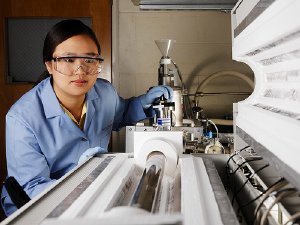Jul 14 2010
Adding a bit of graphene to battery materials could dramatically cut the time it takes to recharge electronics.
 New battery materials developed by the Department of Energy’s Pacific Northwest National Laboratory and Vorbeck Materials Corp. could enable electric vehicles and other consumer electronics to recharge in minutes rather than hours. Here a PNNL researcher prepares and tests lithium ion batteries and lithium/air batteries for vehicle and other mobile applications.
New battery materials developed by the Department of Energy’s Pacific Northwest National Laboratory and Vorbeck Materials Corp. could enable electric vehicles and other consumer electronics to recharge in minutes rather than hours. Here a PNNL researcher prepares and tests lithium ion batteries and lithium/air batteries for vehicle and other mobile applications.
New battery materials developed by the Department of Energy's Pacific Northwest National Laboratory and Vorbeck Materials Corp. of Jessup, Md., could enable electric vehicles, power tools and even cell phones to recharge in minutes rather than hours.
In collaboration with Vorbeck and researcher Ilhan Aksay at Princeton University, PNNL has demonstrated that small quantities of graphene — an ultra-thin sheet of carbon atoms — can dramatically improve the power and cycling stability of lithium-ion batteries, while maintaining high energy storage capacity.
The pioneering work could lead to the development of batteries that store larger amounts of energy and recharge quickly.
Today, a typical cell phone battery takes between two and five hours to fully recharge. Researchers think using new battery materials with graphene could cut recharge time to less than 10 minutes.
Battelle, which operates PNNL for DOE, entered into a Cooperative Research and Development Agreement with Vorbeck for use of its unique graphene material, Vor-xTM, in battery materials synthesis research.